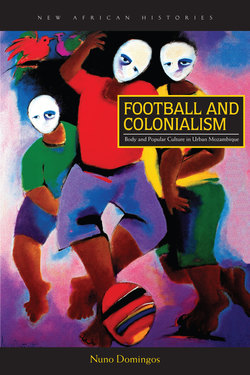Football and Colonialism

Реклама. ООО «ЛитРес», ИНН: 7719571260.
Оглавление
Nuno Domingos. Football and Colonialism
Отрывок из книги
Football and Colonialism
SERIES EDITORS: JEAN ALLMAN, ALLEN ISAACMAN, AND DEREK R. PETERSON
.....
As can be seen clearly from the epic description of the development of physical education in the territory of Mozambique in the 1920s that Ismael Mário Jorge presented at the 1931 Paris Colonial Congress, the state fostered the separation between educational and associative sport, exclusive to settlers and “assimilated,” and the disciplinary practices indígenas were subjected to, as part of their integration into Portuguese military structures and schools. The Estatuto Político, Civil e Criminal Indígenas (Natives’ Political, Civil, and Criminal Statute) did not grant the indígenas any political rights within European institutions.107 Further, the 1933 Reforma Administrativa Ultramarina (Overseas Administrative Reform) barred them from forming administrative corporations. These normative resolutions also excluded indígenas from the right to form associations, including sporting associations. The Carta Orgânica do Ultramar (Overseas Organic Charter), approved in 1929,108 and the RAU gave the colonial administration powers to oversee associations’ activities, to approve statutes, budgets, and administrative bodies, and, if necessary, to put an end to them.109 This supervision was exercised by the Direcção dos Serviços de Administração Civil (DSAC, Head Office of Civil Administration Services), which devoted part of its services to the Agremiações Regionais de Recreio, Defesa, Desporto e Estudo (Regional Leisure, Defense, Sports, and Study Associations). Each sports club had a file in the DSAC. While indígenas were not permitted to lead associations, their participation in the activities of some African clubs, as members and athletes, meant that the clubs came under the supervision of the Direcção dos Serviços dos Negócios Indígenas (Head Office of Native Affairs), equally represented by a section devoted to Agremiações Regionais de Recreio, Defesa, Desporto e Estudo (Regional Leisure, Defense, Sports, and Study Organizations).110 The DSAC and DSNI launched enquiries into some African clubs, whenever they suspected a possible foreign involvement, which was testament to the degree of political control exerted over the field of sport. Later, the Serviços de Centralização e Coordenação da Informação de Moçambique (SCCIM, Mozambique Office for the Centralization and Coordination of Information), created in 1961 by the Overseas Ministry but directed by the local governor, increased the surveillance over associations and sports clubs.111
In 1930 the charter that organized the indígena education system in Mozambique, dividing it into “rudimentary,” “professional” and “normal” teaching—the latter dedicated to the training of teachers—included the discipline of physical education.112 However, when the Mocidade Portuguesa de Mozambique (MP; Portuguese Youth of Mozambique), the first institution devoted to the promotion and regulation of sports activities in the territory, was created in 1939, it was directed exclusively at the “civilized” population. A premilitary youth organization, Mozambique’s Mocidade Portuguesa, modeled on the metropolitan Mocidade Portuguesa—which in turn was inspired by the Italian fascist Balilla and the German Hitlerjugend (Hitler Youth)—was created in 1936 by the Estado Novo within the scope of the Reforma da Educação Nacional (National Education Reform) carried out in that same year.113 The MP’s mission carried on the Estado Novo’s commitment, in line with previous concerns and policies, to the use of physical education as a means of moral, hygiene, and military education.114 During the 1930s, after a period in which the institutionalization of physical education was a slow and convoluted process,115 the regime thus pursued a Europe-wide movement of institutionalization of gymnastic models which, in their various configurations, responded to the pedagogic, hygienic, and premilitary needs of modern nation-states.116
.....